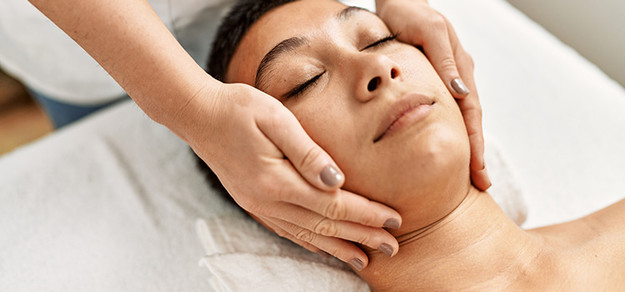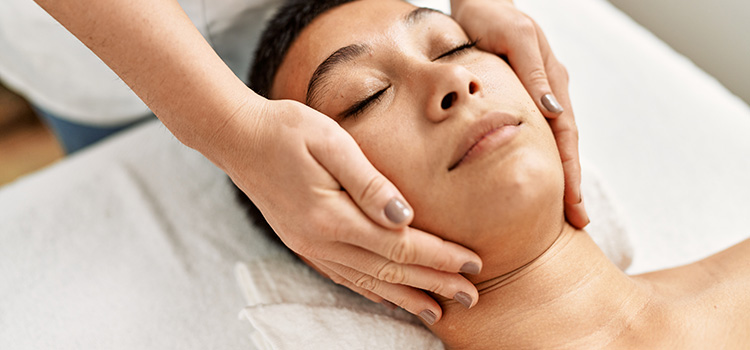Can a Chiropractor Help With TMJ Disorders?
1st Jan 2024

If you’ve recently been diagnosed with a temporomandibular joint (TMJ) disorder, you may be looking for a treatment provider. From dentists to physicians, chiropractors, and TMJ disorder specialists, there are many clinicians to choose from. So, can a chiropractor help with TMJ disorders?
We’ll help you understand what to expect when you visit a chiropractor for TMJ treatment. We’ll explain how a chiropractor can help with temporomandibular joint dysfunction, and we’ll provide information on other treatments you may want to consider.

What Are the Symptoms of TMJ Disorders?
TMJ disorders can cause jaw and facial pain, ear pain, chewing difficulties, and jaw stiffness. In some cases, the temporomandibular joint may lock, making it hard for you to open and close your mouth. Teeth grinding increases your risk of developing TMJ disorders.
How Can a Chiropractor Help With TMJ Disorders?
Your chiropractor will start by asking about your symptoms, including the location and severity of your pain. You’ll be asked when your symptoms started and if anything makes the pain better or worse. After a brief examination, the chiropractor may offer some of these treatments:
Spinal Manipulation:
Also known as a spinal adjustment, spinal manipulation involves applying a controlled amount of force to a spinal joint. Your TMJ chiropractor may use his or her hands or a special device to do this. When force is applied, your spinal joint will move more than it normally would on its own. Spinal manipulation helps to realign your spine and reduce symptoms that are associated with nerve damage.
Massage Therapy:
During massage therapy for TMJ disorders, your chiropractor will focus on relieving tension in your neck muscles and tendons. This treatment method is a type of soft tissue therapy that may be particularly helpful for the relief of TMJ jaw pain. It can improve the range of motion in your jaw muscles.
Exercise Suggestions:
Your chiropractor may show you some jaw exercises you can do to manage your symptoms at home. These could include chin tucks, forward and side-to-side jaw movements, and opening and closing your mouth against resistance. The exercises are designed to reduce pain by stretching and strengthening your jaw muscles, decreasing jaw tension, and increasing the mobility of your temporomandibular joint.
Related Articles:

What Are the Limitations of Chiropractic Treatments for TMJ Disorders?
While chiropractors can provide conservative care, they aren’t medical doctors. This means they can’t offer the comprehensive treatment and advanced care that may be necessary for severe symptoms. Chiropractors are limited by the following regulations:
1. They can’t prescribe medicines.
If you need muscle relaxants, anti-inflammatories, or any other prescription medications for pain relief and symptom management, you’ll need to see a physician.
2. They can’t perform surgery.
If you’re considering TMJ arthroscopy or another invasive procedure, you should be treated by an oral surgeon.
3. They may not be allowed to order, read, or interpret imaging tests.
Some states won’t allow chiropractors to order MRI scans or other types of advanced imaging studies. Although chiropractic radiologists are allowed to read and interpret imaging, chiropractors without this certification will need to have the results read and interpreted by a radiologist.
4. They might not be authorized to administer injections.
Chiropractors are only permitted to administer injections in certain states. If you’re receiving chiropractic treatment in a state that allows this, your chiropractor can give you a corticosteroid injection to relieve pain caused by a TMJ disorder. In other states, you’ll need to see your primary care doctor or specialist to receive injections.
What Other Treatments Should I Consider?
Depending on the severity of your symptoms, you may want to seek TMJ treatment from medical doctors, dentists, or other providers. If you haven’t been able to manage your symptoms with chiropractic treatment, the following options from other healthcare professionals could help:
Medication:
You may need to use pain relievers, anti-inflammatories, muscle relaxants, or tricyclic antidepressants. You could also consider having Botox injections. Your physician will recommend the medicines that are most appropriate for your needs.
Counseling:
A licensed counselor can help you learn to understand and avoid factors that make your pain more severe. Your counselor will teach you deep breathing exercises and other relaxation techniques that may reduce muscle tension and pain.
Biofeedback:
This is a form of alternative medicine that can be used with conventional treatments. During a biofeedback session, electronic devices will monitor the tension in your muscles. Your provider will show you how to use the information from the devices to relax tight muscles.
Mouth Guards or Splints:
These devices will help to reduce the clenching and grinding behaviors that could worsen TMJ pain.
Surgery:
Depending on your symptoms, you may be advised to consider having TMJ arthroscopy, arthrocentesis, open-joint surgery, or a modified condylotomy. Ask your surgeon about the risks and benefits of these procedures.
Related Articles:
How Can I Optimize My TMJ Disorder Treatment?
To get the most from your treatment, you might need to receive TMJ disorder care from several healthcare providers. When you visit a provider, make sure that you ask about the benefits and risks of any proposed treatments. You may want to keep a symptom journal so that you can identify the treatments that seem to be particularly helpful.
Lifestyle modifications and home remedies could help you manage pain and reduce muscle tension between treatment sessions. For example, you may want to choose soft foods instead of sticky or chewy ones, and it’s advisable to avoid chewing gum. Make sure to cut your food into small pieces that are easy to eat. If you’re in pain, placing hot or cold packs on the sides of your face might help you feel more comfortable.
Always consult your healthcare team if you notice any new or worsening symptoms. With a combination of professional treatment, lifestyle modifications, and home remedies, you can find relief from the pain of TMJ disorders.
Sources:
- Hildebrandt, P. (2010). What is Chiropractic Radiology? Radiology Today. https://www.radiologytoday.net/archive/rt0810p20.shtml
- Illiades, C. (2021). What a Chiropractor Can't or Shouldn't Treat. Healthgrades. https://www.healthgrades.com/right-care/chiropractic-care/what-a-chiropractor-cant-or-shouldnt-treat
- McClaren, J. (2022). Will Chiropractic Care Help TMJ Pain? Understanding Treatment Options and Benefits of Chiropractic Care for TMJ. Cascade Spine & Injury Center. https://cascadespineandinjury.com/can-a-chiropractor-help-with-tmj/
- Spinal Manipulation: What You Need To Know. (2022). National Center for Complementary and Integrative Health. https://www.nccih.nih.gov/health/spinal-manipulation-what-you-need-to-know
- Townsend, D. (2022). Can Chiropractors Give Cortisone Shots? Center for Genius Authoritative Answers. https://www.cgaa.org/article/can-chiropractors-give-cortisone-shots

- Most Popular
- Hard Outside, Soft Inside
- 2MM Thick
- Moderate / Heavy

- Most Durable
- Hard Materials
- 1.5MM Thick
- Heavy / Severe

- For Day Time Use
- Thin, Barely Visible
- 1MM Thick
- Light / Moderate

- For Clenching
- Flexible & Soft
- 1.5MM Thick
- Light / Moderate

